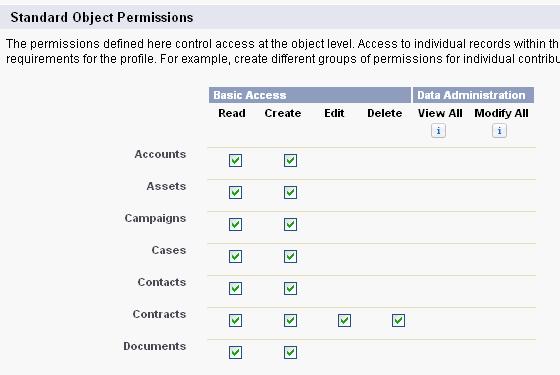You need to sign in to do that
Don't have an account?
Access and Update Contacts through Public Knowledge Website
Hi all,
I created a public knowledge website (without login) in which I have added a case creation form. Whenever I create a case through the website, it will create a contact of the user who have created that case.
If the same user tries to create a case, my code checks if the contact is already available in salesforce and appends the case to that contact. But this functionality is working only for the contacts which are created through the Website (using Guest user account).
The problem is that this functionality is not working for manually created contacts (through logged-in salesforce user account). My code doesn't even finds the contact which was manually created.
Below is my controller code.
I
From above privileges on profile screenshot, I could see that I don't have the 'edit' permission for contacts. But I wonder how the website is able to edit and append contacts which are created through the website but not the manual contacts.
Please help me out guys.
Thanks in advance
I created a public knowledge website (without login) in which I have added a case creation form. Whenever I create a case through the website, it will create a contact of the user who have created that case.
If the same user tries to create a case, my code checks if the contact is already available in salesforce and appends the case to that contact. But this functionality is working only for the contacts which are created through the Website (using Guest user account).
The problem is that this functionality is not working for manually created contacts (through logged-in salesforce user account). My code doesn't even finds the contact which was manually created.
Below is my controller code.
public with sharing class CreateCaseController {
public string caseIDVal = '';
public Contact conRec{get; set;}
public Case caseRec{get; set;}
public String contactEmail{get; set;}
List<Contact> getContactDetails;
public CreateCaseController(){
conRec = new Contact();
caseRec = new Case();
}
public pagereference saveData(){
System.Debug('======================>>>> hit inisde saveData function');
if(conRec.lastName== null || caseRec.SuppliedCompany == null || contactEmail == null || caseRec.Subject == null || caseRec.Description == null || caseRec.Impact__c == '--What is the impact?--')
{
PageReference pageRef = new PageReference('/createcase');
ApexPages.Message myMsg = new ApexPages.Message(ApexPages.Severity.ERROR,'Please fill-in all the details to create a case!');
ApexPages.addMessage(myMsg);
//pageRef.setRedirect(true);
return pageRef;
}
else
{
createContactRecord();
System.Debug('======================>>>> hit after createcontactrecord function');
caseRec.ContactId = conRec.Id;
if(caseRec.Impact__c == 'Just me')
{
caseRec.Impact__c = 'Low';
caseRec.Urgency__c = 'Low';
//caseRec.Case_Priority__c = '3';
}
else if(caseRec.Impact__c == 'Some users but not all')
{
caseRec.Impact__c = 'Low';
caseRec.Urgency__c = 'Medium';
//caseRec.Case_Priority__c = '2';
}
else if(caseRec.Impact__c == 'Everyone in the company')
{
caseRec.Impact__c = 'Low';
caseRec.Urgency__c = 'High';
//caseRec.Case_Priority__c = '1';
}
insert caseRec;
PageReference pageRef = new PageReference('/caseconfirmation?caseid='+caseRec.Id);
pageRef.setRedirect(true);
return pageRef;
}
}
public void createContactRecord()
{
System.Debug('======================>>>> hit inside createcontactrecord function');
try
{
getContactDetails = [SELECT ID FROM Contact WHERE Email = :contactEmail LIMIT 1];
System.Debug('======================>>>> hit inside createcontactrecord function try');
if(getContactDetails.size() == 0)
{
conRec.Email = contactEmail;
System.Debug('mailID doesnot exist=====>'+contactEmail);
insert conRec;
System.Debug('contact newly created.=====>>>>conrecid===='+conRec.Id);
}
else
{
for(Contact cntct : getContactDetails )
{
System.Debug('mailID exist=====>'+contactEmail);
System.Debug('contactid========='+cntct.Id);
conRec.Id = cntct.Id;
}
}
System.Debug('contactid='+conRec.id);
}
catch(System.Exception ex)
{
System.Debug(ex.getMessage());
}
}
}
the function saveData is the form submission action.I
From above privileges on profile screenshot, I could see that I don't have the 'edit' permission for contacts. But I wonder how the website is able to edit and append contacts which are created through the website but not the manual contacts.
Please help me out guys.
Thanks in advance






 Apex Code Development
Apex Code Development
All Answers
I will give it a try using the 'without sharing' keyword as you suggested.
Since I have'nt added any pages where in the users could view any contacts anyway, how will it be a security risk?
Could you please enlighten me on that?
Its safer to move discrete functions to a without sharing class, as the main controller then still respects sharing and the chances of inadvertent data exposure are eliminated (or much reduced anyway).
using the 'without sharing' keyword made it to work. But after adding the keyword in the code, I got an exception as below.
System.NoAccessException: The organization is not permitted to send email
Then I found that the Sandbox environment Mail Deliverability is set as 'System email only' which was the reason that generated the exception.
I read through the SF articles and found that the Sandbox environments are set to 'System email only' in default to prevent developers from accidentally sending mails to customers.
So I changed it to 'All email' and it fixed the issue.
Once again thanks for your help Bob.